Getting The Most Out Of Google+
If you've just signed up for Google+ you may have found yourself in an empty clubhouse wondering just what all the fuss is about. Follow these tips and you'll soon discover how it resolves so many flaws from previous social networks.
-
Do Not Expect Another Facebook

The initial tendency to compare Google+ to Facebook is understandable, but the functionality of Circles makes it fundamentally different. As Christina Trapolino put it, "Stop treating Google+ like Facebook." (If you absolutely must put your Facebook stream in your Google+ then there's a Chrome extension for that.) Facebook has been a great way to re-connect with old friends and family that you've fallen out of touch with over the years. Unfortunately, it often serves as a reminder of all of the reasons why you haven't kept in touch. Not all friendships are created equal. That's where Circles come in.
-
More Circles Means More Granular Filtering
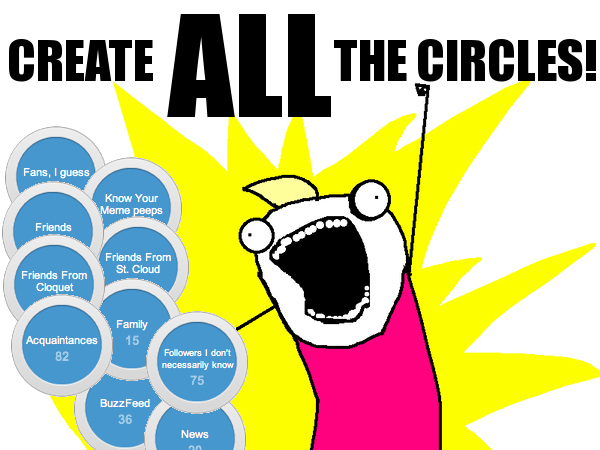
(Note: The image above is a unique iteration among literally hundreds of iterations of the X all the Y meme, an Internet meme based upon source material from Hyperbole And A Half.)
By now you've probably grokked how nice it is to show off your party pics with your friends and not your family or coworkers. But the utility of Circles doesn't end there. Think back to when Myspace was new. You added all your friends from the real world, and then some of your friends started adding people they had never met. There were all those tacky individuals on a race to collect the most friends they possibly could, meanwhile you sat back proudly reminding people, "I only follow people I actually know." This same relationship-valuing paradigm still applies to networks like Facebook, LinkedIn, and Twitter, where a person with thousands of followers is often just a fame-seeking friend whore. But being in someone's Circle doesn't carry the same connotations as being someone's friend. The problem lies in the implications of the word "friend." Is someone who's work you admire but have never met really your friend? Furthermore, are the people who follow the comedy blog or news site that you write for really your friends? -
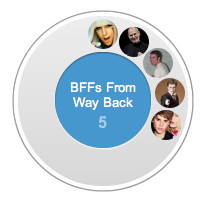
No. Don't delude yourself. Instead, figure out realistic definitions of your various kinds of relationships, and keep in mind that Circles are not mutually exclusive. Because being in a Circle doesn't imply anything about the level of the relationship, there's also no shame in having literally hundreds or thousands of people in your Circles. You might have a personal friend with whom you share hilarious NSFW content with in private, but with whom you also do some sort of professional and public business with. You don't have to choose whether this person is your buddy or your colleague when they clearly fit into both circles.
-
We Don't Know Each Other? Perfect! You Are Now My Audience!
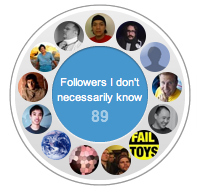
On Facebook I'd always get concerned by receiving Friend Requests from total strangers, thinking, "Who are you? What do you want from me?" On Google+ there's no expectation of reciprocity. So friend whores, spammers, and total strangers who are just interested in what I do can all be lumped into one very easy and convenient circle that I'm calling "Followers I don't necessarily know." The purpose of this circle isn't to exclude these strangers who are (for whatever reason) interested in what I have to share. But they're definitely the people who I will share whatever I want with. So if I want to spread the word about a friend's band, recommend a great restaurant, or self-promote to my heart's content then these are the right people to do that with. So my professional colleagues and certain friends can get all the really heady articles I like about about collaborative culture on the web, my mom and sisters can see my complaints about adjusting to a gluten free diet, and the followers I don't know much about can see the admittedly noisy stream of content I'm promoting.
-
Make A Bookmarks Circle
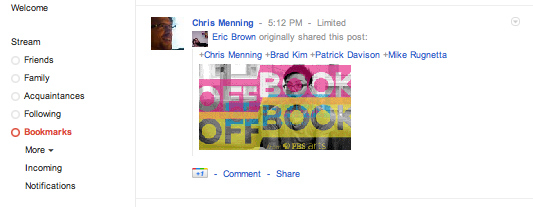
Wondering how to easily find a post that you made a week ago so that you can see how many people have interacted with it? Craig Kanalley wrote of a novel approach to this in the form of a Bookmarks Circle. Don't add any people to this circle. Instead, share whatever posts you'd like to bookmark with this circle.
-
Broadcasting, Consuming, and Interacting
On Twitter it's considered rude to simply broadcast your message without interacting with your followers. At the same time, consuming information on Twitter without broadcasting or interacting is perfectly acceptable because consumption is essentially an invisible behavior. On Google+ your style of behavior ought to be customized to different types of circles. If you've created a circle for reading about celebrity gossip, simply reading without interacting might be fine for you. That's your prerogative. In this way, your "News Circle" might be treated a bit like an RSS Reader. Now let's assume you're a standup comic riffing on some new material to your fans. Don't feel obligated to interact with everyone who comments. You're the one making joke-telling into a profession. You're the entertainer in this scenario, so broadcast away. If someone heckles you in the comments, you can block that user. If someone simply rephrases your joke, blatantly stating the implied obvious punchline (the "Thank You Captain Obvious Effect") feel free to ignore them. The Entertainer-Audience relationship is one that functions best in a broadcast dynamic. If you're a community manager trying to cultivate collaboration, then DO NOT simply broadcast your message. The community that you've been charged with looking after needs your interaction.
-
Quality Over Quantity
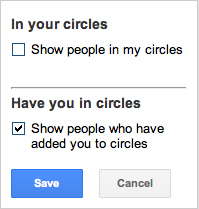
It's long been understood that the number of people in a person's network is far less important than the quality of each of those relationships. That quality is usually measured in terms of interaction. The fancy social media buzzword for this is "engagement" but the common sense term is "being a decent person." Now that you have the control to strategically target different groups with the content and level of interaction that makes the most sense for each, use it wisely. Depending on the nature of your circles, you may or may not want to publicly share who you're following and who's following you. Thankfully, you can choose whether to hide or show those in your Circles and those who have you in their Circles. Personally, I choose to hide those in my Circles and show those who have me in their circles because I respect others' privacy but love to brag about my increasingly irrelevant number of followers!
